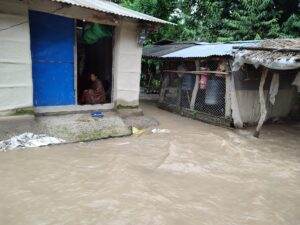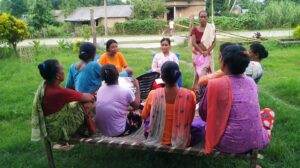Flood-hit farmers in Nepal get first pay-out under new climate insurance scheme
A unique climate insurance program in Western Nepal is gaining support after thousands of farmers found a way to protect themselves against increasingly violent flooding.
The program, run by Practical Action, has paid out insurance claims of more than $28,000 to nearly 1000 small holder farmers who are vulnerable to the effects of climate change.
The beneficiary farmers are from flood-prone areas of Nepal. The payments they received representing 25 per cent of their insured amounts in claims.
Bikram Rana, Project Manager for Practical Action’s Index-Based Flood Insurance (IBFI) project, said, “This is the first of its kind in Nepal and the pay-outs made to farmers have increased trust towards this insurance scheme.”
“Through this project, we have developed a pilot of what a locally appropriate climate insurance product might look like.”
“We have also worked with the national government to show them a product that works to protect poor, vulnerable farmers.”
“It has led to our recognition as local experts in the issue, with our donors willing to offer additional financial support for this approach. This is an innovative approach that fits the local farmers needs. All the cooperatives and farmers I have spoken to certainly appreciate it.”
Flooding is a global issue that affects over 1 billion people annually. In developing countries, floods can be especially devastating for those who live in low-income communities. People in poorer flood-prone areas can lose everything when floods hit and may not have the means to mitigate the risk posed by floods. When the floods recede, they must start from scratch with nothing.

October 2022 flood in lower karnali, Rajapur, Geruwa, Tikapur and Janaki
The Index-Based Flood Insurance (IBFI) project was introduced in March 2021 to strengthen the resilience of developing countries to protect the lives and livelihoods of poor and vulnerable people against the impact of floods.
Implementation of the IBFI project is led by Practical Action and its partner Global Parametrics, Sikhar Insurance company and Stonestep, with funding from InsuResilience Solutions Fund (ISF) and Zurich Flood Resilience Alliance (ZFRA) through Z Zurich Foundation.
Kaidu Katharia, a beneficiary from Janaki Rural Municipality, said, “I insured my paddy for four bighas (sq meters), and I got the pay-out 25% of the insured amount in a short period after the flood hit the agreed trigger in September 2022.”
Katharia says he was able to claim his funds easily, and there was no hassle in the claim process. The program also has a social safety net that allows cooperatives to support farmers affected by flooding or other natural disasters.
The project, which is in its second year, when completed, is expected to:
- Make index-based flood insurance product which has been developed and rolled out become the acceptable risk transfer product for climate-vulnerable smallholder farmers in Western Nepal.
- Increase the resilience of vulnerable smallholder farmers in selected five local governments of Sudurpaschim and Karnali Provinces by enabling access to insurance products and services. This makes it easy for them to put their lives together when floods hit.
- Reach nearly 5,000 households in the first year and 14,000 households by the end of the project in March 2023.
- Create an enabling environment and knowledge for piloting and scaling up an index-based flood insurance product that caters to the needs of climate-vulnerable farmers in Nepal.
The project’s pilot in lower Karnali River has also come to a pay-out stage after the flood hit the agreed indices. Insured Farmers in the area got pay-outs of 25% in 2022, to put their lives back together after the devastating floods that hit the region.

Some beneficiaries of the insurance scheme
The project’s key features that make it unique and innovative are its pre-defined, pre-agreed Indices, which link science with the community. The claim process is simplified and reduces administrative hassle. It involves the private sector and micro institutions, and this develops strong local ownership.
The project has been successful so far as it has developed a model for sustainable insurance products that can be replicated across Nepal for years.